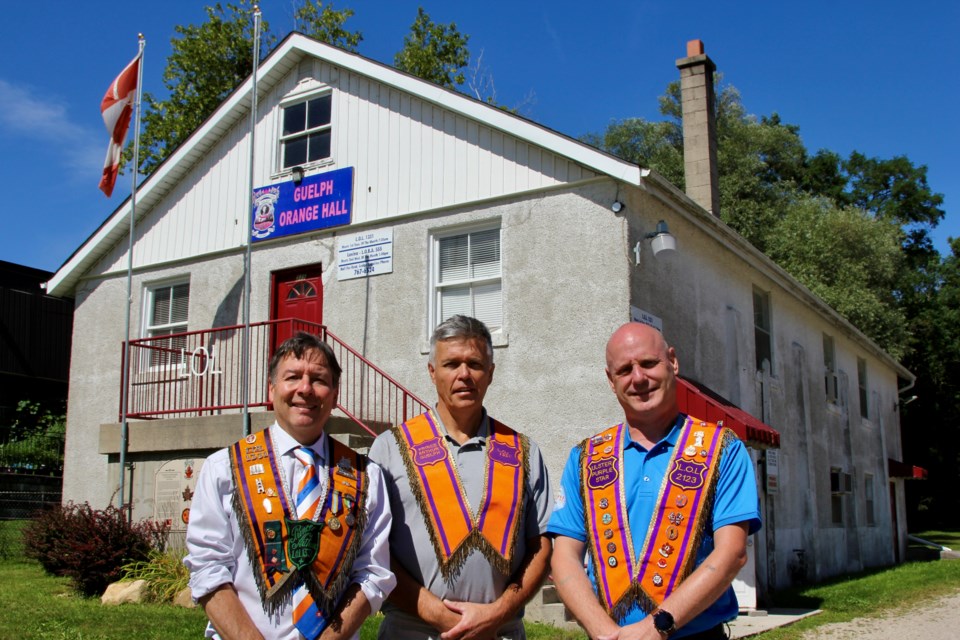The last standing Grand Orange Lodge in Guelph may feel forgotten but it doesn’t stop its members from helping the community and striving to keep Canadian history alive.
The Loyal Orange Order on Waterloo Avenue also known as Prince Arthur Guelph Loyal Orange Lodge #1331, turns 150-years-old this year and while it cannot celebrate due to the pandemic, its members want the community to know its still very much there and that it plays an important role in Canadian history.
Nearly two centuries ago, there were approximately 3,000 Grand Orange Lodges spread across Canada, with Guelph being home to half a dozen.
The Loyal Orange Association, a protestant fraternal organization, came to Canada from the UK in the early 19th century. With many immigrants from Britain and Ireland in that time period, the Orange order established in Canada, took care of its community and helped Protestant immigrants settle. Those same Orangemen answered the call to the First and Second World War where many gave their lives for their country. But after the war, the lodges saw a decline in membership across the country.
The Grand Orange Lodge in Guelph itself saw a decline in membership over the years with only 18 members part of the order in Guelph but even now, the main hall inside is filled with awards, certificates and badges recognizing Orange men from the First and Second World War and members’ community involvement. Many families even donated old Orange memorabilia to the lodge over the years.
Chairs in the main hall have cushions covered in the City of Guelph's official tartan, donated by the city giving the lodge a unique Guelph touch.
“I think it's important to learn our history and to recognize what our forefathers did to build this country or helped to build this country, and I think organizations like ours helped to keep that alive,” said the lodge's deputy master, Paul Allen, adding the lodges also saw Canadian prime ministers as members of the order in the past.
“I don't know whether we'll make it another 150 years, I don't think we probably will but we just want people to remember some of the folks that helped to build this country and make it a great country that it is today.”
Allen stressed that although a protestant organization, the tenets of the organization are based on civil and religious freedom for all people regardless of creed or colour. He gives the example of Mohawk Loyal Orange Lodge No. 99 on the Mohawk Reservation in Deseronto, Ontario which has many members of Indigenous and Italian descent.
He said the lodge has been hit hard by the pandemic. With 18 members remaining, their main source of income is renting their hall out to community members which hasn’t been possible during the pandemic.
“During the pandemic we have had no income, and we have only been able to pay our bills by taking out a loan and through donations from our members, but we are still alive and hope to do so for many years to come,” said Allen.
Allen said it's important to remember the Orange Order is continuing a legacy.
“We feel forgotten about so we don't sit and complain, we, we look at ways that we can be more integral in the community and hopefully people will will recognize that we're not looking for plaudits we just want people to know that we're still here, and that we want to play a more active role in the community,” said Allen.
“One of the things we've tried to do over the last three or four years, is try to be more visible.”
In 2018, the lodge held a service to commemorate John McCrae and in 2019, they held a service for the 75th anniversary of the D Day parade where the community gathered and reflected on the significance of the event. The building has also been a part of Doors Open Guelph which brought the building’s history to light.
Allen said even though it's the last lodge standing in Guelph, he believes there’s a place for historical organizations such as the Orange Order in the community.
“A lot of these lodges were set up in a lot of these small towns in Ontario and across Canada back in the early 19th century and they served as like proper community hubs for people from all fates, to just bring people together,” said Allen adding that the message of what the lodge was tends to be quite lost today.
“I think we tend to forget what it was like for the first folks who came to Canada from the UK from Europe and around the world and just how little they had and now they needed that community.
The lodge ordered 150 limited edition pin badges to celebrate the 150th anniversary and has already sold most of the pins across Canada, England, Ireland and Scotland. They also created a limited edition book of stamps, which people can use to send mail locally and internationally.



.png;w=120;h=80;mode=crop)